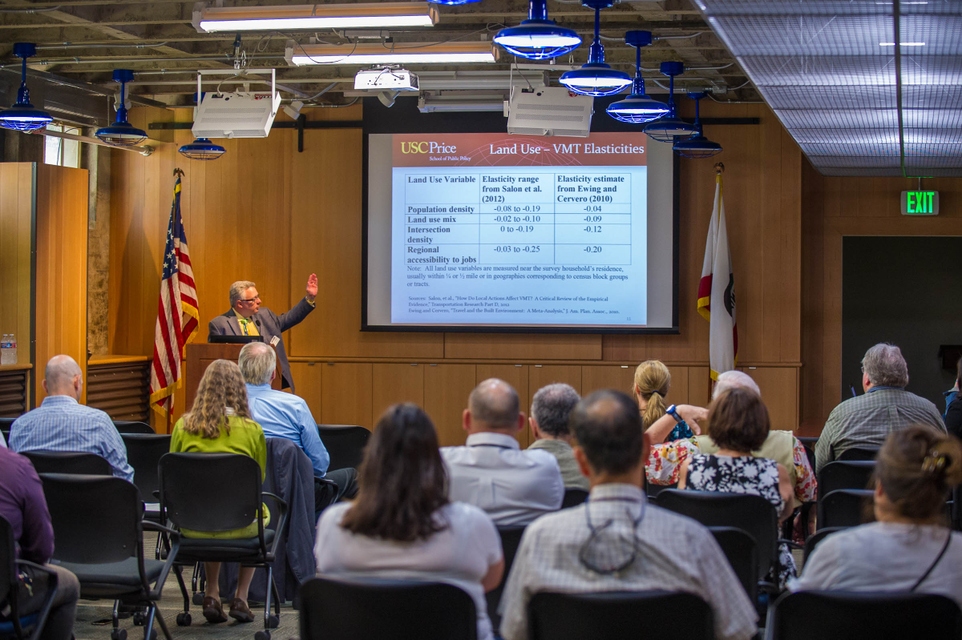News | METRANS Researcher Marlon Boarnet Presents at Caltrans Research Connection
Stop the VideoNews

METRANS UTC
METRANS Researcher Marlon Boarnet Presents at Caltrans Research Connection
Friday, June 24, 2016
by By Kaitlyn Zhang, MPP 2017

Photo by California Department of Transportation
On June 6th, METRANS researcher Professor Marlon Boarnet from the Price School of Public Policy, University of Southern California (USC), presented his research on urban travel behavior as part of the Research Connection webinar held by the California Department of Transportation (Caltrans) Division of Research, Innovation and System Information at Caltrans Headquarter, Sacramento. California.
Professor Boarnet's Caltrans presentation "Is It Location, Location, Location? - Do People Who Live Near Employment Sub-Centers Drive More? Or Less?" discussed the ways urban structure and employment location influence Vehicle Miles Traveled (VMT). Since Southern California is highly polycentric, meaning that it has multiple sub-centers instead of one highly concentrated city center, the core question of the project became whether the average daily VMT is related to the distribution of employment. The studied area is the Los Angeles Combined Statistical Area (CSA), which consists of five counties: Los Angeles, Orange, Riverside, San Bernardino, and Ventura.
Boarnet shared his research findings from his and USC Ph.D. candidate Xize Wang’s recently completed project, Urban Spatial Structure and the Potential for Reducing Vehicle Miles Traveled. This project was funded by Caltrans through METRANS Transportation Center and was published this April (https://www.metrans.org/research/urban-spatial-structure-and-potential-vmt-reduction). This research is also supported by the National Center for Sustainable Transportation.
In this research, Boarnet and Wang started by identifying all employment sub-centers locations. They then built a regression model using sub-center locations, job locations, and job quantity to explain the average household travel data from the 2012 California Household Travel Survey.
Results of the regressions show that non-centered jobs have a stronger correlation with VMT than centered jobs. Household VMT in coastal counties like Los Angeles and Orange Counties is more sensitive to job accessibility than it is in inland counties. The relationship between job accessibility and VMT is more substantial for homes within 5 miles of a job sub-center. Boarnet and Wang’s conclusions from the data suggest that land-use policy or policy that increases job access for the goal of reducing VMT should target locations with good employment accessibility, but not those with exceptionally high accessibility and/or minimal job access.
A video recording of the presentation can be viewed here. Presentation slides can be viewed here.
Professor Marlon Boarnet
Dr. Boarnet is Professor and Chair of the Department of Urban Planning and Spatial Analysis at the University of Southern California. Dr. Boarnet is also a renowned authority on urban economics, urban growth patterns, transportation, and regional science. He is an expert in transportation and land use, and has served on the National Research Council committee that authored “Driving and the Built Environment."
Kaitlyn Zhang
Kaitlyn (Kenan) Zhang is a first-year Master of Public Policy (MPP) student attending the Sol Price School of Public Policy at the University of Southern California. Her interests are in transportation policy, urban development, and economics. She is also working towards a certificate in Transportation Systems from the Viterbi School of Engineering, and is an active student member of and volunteer for WTS Los Angeles.
News Archive
- December (1)
- November (6)
- October (4)
- September (2)
- August (3)
- July (4)
- June (3)
- May (7)
- April (8)
- March (11)
- February (8)
- January (7)
- December (7)
- November (8)
- October (11)
- September (11)
- August (4)
- July (10)
- June (9)
- May (2)
- April (12)
- March (8)
- February (7)
- January (11)
- December (11)
- November (5)
- October (16)
- September (7)
- August (5)
- July (13)
- June (5)
- May (5)
- April (7)
- March (5)
- February (3)
- January (4)
- December (4)
- November (5)
- October (5)
- September (4)
- August (4)
- July (6)
- June (8)
- May (4)
- April (6)
- March (6)
- February (7)
- January (7)
- December (8)
- November (8)
- October (8)
- September (15)
- August (5)
- July (6)
- June (7)
- May (5)
- April (8)
- March (7)
- February (10)
- January (12)















